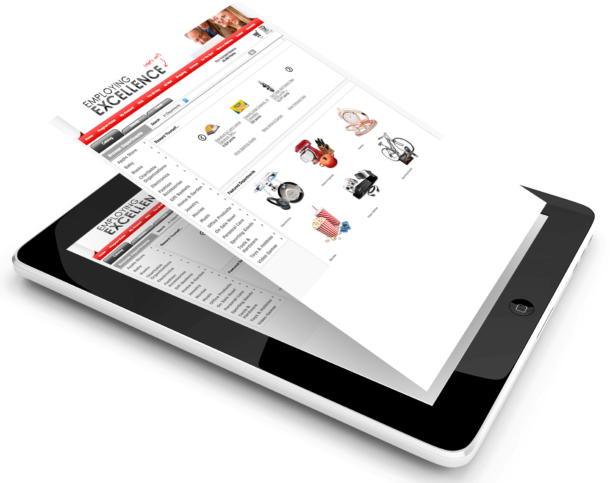Most suppliers don’t have the opportunity to build loyalty with those who use their products. Customers may buy one HVAC every ten years, for example. Customer loyalty can’t really be built on that timeline. Often, the contractor is the one who needs to understand and advocate for the manufacture’s product. Therefore, your suppliers greatly value contractor loyalty. But do they act like it?
Knowing your loyalty’s worth helps you leverage and improve relationships with your manufacturers or suppliers. It helps your business thrive, which helps your supplier thrive. Let’s examine four things you can and should expect from a good supplier:
- Valuable Marketing Resources I don’t just mean “they market to you.” Your supplier needs to market through you, so they should be properly equipping you to promote products and services on their behalf.Some examples of marketing resources you should expect from suppliers:
- Marketing Automation Platform You may be one of the many SMBs who have limited to no marketing resources. If that’s the case, your vendor should extend their marketing capacities and technology to you. This is easy for them to offer with today’s channel marketing and partner program technology options. Access to a marketing automation technology is so easy that many dealers or contractors invest in a low-cost, off-the-shelf marketing platform and actually charge vendors a fee to join it! This should give you plenty of leverage with a supplier who doesn’t understand the importance of offering you their marketing automation resources.
- Topic-Diverse Content You supplier should provide not just product-based content, but a mix of thought leadership, industry news, helpful insights, product and service updates, even co-branded content.Research and studies are particularly effective forms of co-branded content. It benefits you because you may not have access to the product and market research firms that suppliers work with, and it benefits the supplier to have their research dispensed to your customer list. I like how Hinge Marketing puts it:“For B2B marketers… co-branding with research is based on data and does not come across as a sales pitch. In fact, it often influences or validates how buyers are thinking and helps to speed up the sales cycle.”
- Multimedia, Multichannel Content As it gets harder to cut through the marketing noise audiences are pummeled with every day, multimedia content becomes increasingly necessary. Lead Forensics reported that 95% of B2B marketers understand the importance of a multichannel approach, but only 14% have successfully implemented one.Suppliers should offer you content delivered through a variety of mediums and channels to suit your customers’ varying communication needs and preferences. This includes but isn’t limited to videos, webinars, infographics, articles, social media content, pdfs, etc.
- Personalized Promotions & Content Time is one of the biggest challenges today’s contractors face. Installations, maintenance, traveling, tracking down the right parts, marketing, customer service—it all takes time. You shouldn’t have to devote extra time navigating dozens of different supplier partner portals to find the messages that are relevant to you.Suppliers can segment their channel partner audiences and offer specific promotions, updates, and resources based on your business objectives. Marketing technology is far past the days of the indiscriminate email “blast” to everyone. With 69% of B2B buyers saying they value suppliers who provide personalized offers, it’s absolutely a standard your suppliers should uphold.

You don’t have time to market for all your suppliers. That’s what their (often extensive) marketing experts and resources are for. They should be able to not only explain why their products are valuable, but understand the best and most effective ways to communicate that value. Speaking of which…
- Value & Performance Price is one thing; you certainly don’t want to pay more for a supplier’s product than you can justify. But consider other ways to evaluate a brand and determine its overall value:
- Technical Support With any luck, you won’t spend much time with a brand’s tech support. But when the going does get tough, does support step up? Do they address your issue knowledgably and sufficiently, without hours of hold music? Bad tech support usually points to a broader problem with how much the brand prioritizes product quality and customer satisfaction. Even if you don’t service your customers yourself, you should spend some time finding out how a brand’s tech support measures up.
- Supplier Performance You may work with a particular brand because of their low-cost offerings, but make sure you’re not paying for those savings with follow-up repairs, slow delivery or restocking times, poor responsiveness, low acknowledgement rate, or other high costs of your time. A unit may be irresistibly cheaper, but are you going to get an average of three calls per install from unhappy customers experiencing issues? Tracking supplier performance will help you compare supplier to see if one brand seemed cost-effective at first glance, but is actually low-margin in the long run.
- The Little Things Not every little thing a supplier does to maintain the contractor relationship is truly impactful, but often a lot of little things add up to something pretty substantial. Some of the extra benefits you might enjoy from a supplier include:
- Making parts kits available—these can often save you from a jam
- Fast, convenient communication methods such as live chat
- Accountability and transparency when they make mistakes
- Easy-to-use ecommerce platform
- Corporate values that match yours
- Customer service – someone who answers the phone when you need them
A product’s price-tag is often only a small portion of the product’s overall value, especially when it comes to complex equipment vital to your customers’ home or office building. When you’re evaluating a supplier, look at the bigger picture to see if they’re truly earning your loyalty.
- A Worthwhile Loyalty Program Your supplier’s loyalty program should be more than just a way to earn rewards. If it feels like it’s just a shiny, hollow toy to distract you from competitors… then that’s probably exactly what it is. A worthwhile contractor loyalty program is easy to use, engaging, and mutually beneficial. Expect benefits and features such as:
- Relevant Promotions Above, I mentioned that you should expect personalized communications and promotions. This should extend to reward-earning promotions, too. A supplier could use the program to help you with pre-seasonal sales, for example. A credit or exclusive rebate on an item just before its high-demand season kicks in? That’s a true reward for your loyalty, not just a marketing gimmick.
- Effortless Data Submission Your suppliers want your customer data. They really want your customer data. In fact, when a Dun & Bradstreet and Adweek study asked B2B marketers what their biggest hurdles were, almost every single answer had to do with customer data. Two of the most common answers were “Lack of insight into the customer journey” (26%) and “Lack of available data sources” (21%).Your suppliers are almost certainly willing to reward you for providing customer data. Not only should they reward you, they should make data submission fast and easy. A document upload tool with claims verification, for example, allows you to submit a warranty registration, invoice, or other sales claim documentation right from the field and receive your reward instantly.The supplier could also share their sales insights with you when they analyze this data. This way, you don’t just earn a reward in exchange for valuable data, but the process costs you far less time and yields insights that can help you improve your own sales strategies and customer retention rate.
- Mobile Accessibility & Real-Time Alerts Everyone hates missing out on a deal. If you open your inbox to find a two-month-old email from your supplier loyalty program, buried in the spam folder, telling you all about the great deal you missed out on…then your loyalty program isn’t cutting it.The program should be mobile-accessible, so you can use the program wherever you are, whether on a job or at home or in the office, rather than having to wait till you’re at a computer. You should receive promotion alerts where you’ll actually see them, when they’re convenient for you, i.e. before you buy a qualifying product.
- Desirable Rewards This is key: the loyalty program’s rewards should actually be valuable to you, and proportional to the actions you’re rewarded for. Would you or your contractors rather have gift cards than debit cards? Are you more interested product discounts than points you can spend in a merchandise catalog? Today’s loyalty program technology isn’t limited to a single reward type. You should expect rewards that have high, personal value to you and make it worth it to go the extra mile.
The words “loyalty program” shouldn’t make you want to roll your eyes. A supplier’s loyalty program should be reflective of their priorities, indicating how much they value your time, input, skill, and experience. It shouldn’t merely be a way to squeeze more business out of you, but a tool designed to forge a stronger, more fruitful relationship.
- Training and Enablement It should be one of your supplier’s top priorities to properly train contractors on their products. Who wants to sell a product they don’t fully understand or have complete confidence in? Training is not only essential, it’s an ongoing process. It’s not as simple as downloading a product spec sheet. Here are some expectations you should have for your supplier’s training and sales enablement resources and processes:
- Easy to Complete & Repeat Studies show that repeating and recontextualizing information helps with learning because it leads us to “reconceptualize information and create multifaceted memories that are more easily accessed.” Whether you access training and enablement resources on a partner portal, a training incentives platform, or an online resource community, you should be able to test and reinforce knowledge with everything from intensive courses to short quizzes and even daily trivia questions.
- Multimedia Resources We all have different learning styles. While spoken information might go in one ear and out the other in some people, they may instantly pick the idea up if they have a visual of it being applied. Your suppliers should offer multimedia options for learning about their products. Do they have installation demo videos? Full courses on how and why their new product is effective? Case studies and detailed product specs? Images of parts and processes?Contractors often have to install equipment or solve problems that require highly specialized knowledge. That knowledge should come from detailed, thorough resources that use all available mediums to fully explain a product’s features and applications.
- Up-to-Date Information To be the best possible contractor to your customers, you need access to accurate, up-to-date information about the products you deliver or install. Is your supplier’s only available training a course in installing a model that’s five years old? There’s no excuse for this. Technology makes it easy to deliver information that enables you to do your job to the best of your ability. Expect no less from suppliers!
Your supplier’s goal is for you to sell more of your brand’s products than their competitors’, but your goal is to a happy customer base and growing margins. Your suppliers need to meet their goals through meeting yours. One of the best ways they can do that is by giving you ample training and enablement resources. Being well-trained on a high-performing brand saves your time and resources while increasing your sales success.
When we talk about performance in industrial and mechanical realms, often we’re talking about how well a unit performs or how skillfully the contractor installed it. But manufacturers and suppliers should be judged on their performance levels, too. They rely on you to represent their brand, but you rely on them to adequately equip you with marketing and training resources, an experience that doesn’t cost you time and money, and incentives that fuel a mutually beneficial partnership. Suppliers value your loyalty and, because the nature of regulations and standardizations mean one brand is often very similar to another, they must earn contractor loyalty by being easy and enjoyable to work with. Don’t be afraid to ask for or expect more from suppliers so that you’ll both be more successful.
 Nichole Gunn is CMO at Incentive Solutions, where she has been exploring ways to help companies grow channel revenue for over ten years. Incentive Solutions manages 220+ channel incentive programs, many of which are in industrial manufacturing and distribution. Nichole can be reached at ngunn@incentivesolutions.com.
Nichole Gunn is CMO at Incentive Solutions, where she has been exploring ways to help companies grow channel revenue for over ten years. Incentive Solutions manages 220+ channel incentive programs, many of which are in industrial manufacturing and distribution. Nichole can be reached at ngunn@incentivesolutions.com.




Join the conversation: